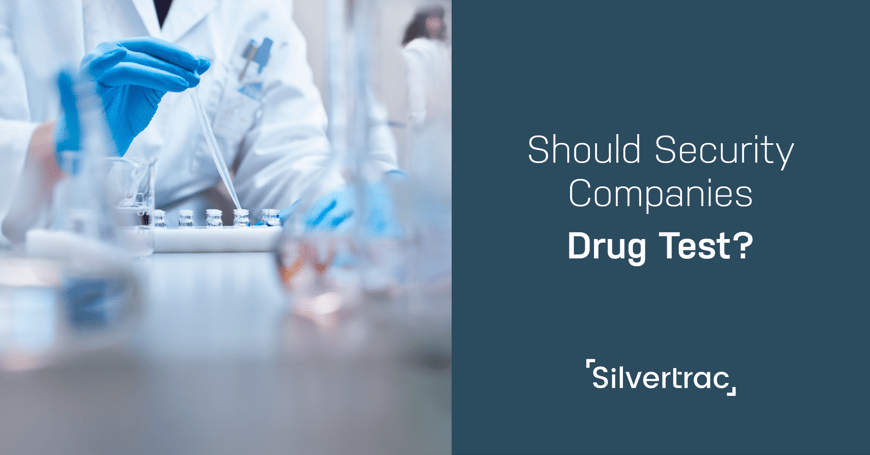The Silvertrac Extra
Should Security Companies Test Employees for Drugs and Alcohol?

Security officers are often held to a higher degree of scrutiny than employees in other industries. Ensuring the safety of the people & property they are tasked to protect is a top priority; but what if a threat comes from the employees themselves?
More security companies are considering drug & alcohol testing to protect their company and ensure the safety of their clients. Learn about the benefits and drawbacks of drug and alcohol testing to determine whether it is the right choice for those in the security industry.
The Benefits of Drug and Alcohol Testing
One benefit, particularly to those in the security industry, that draws employers to drug and alcohol testing is decreased liability. Guards & employees who are working under the influence of drugs and/or alcohol are more likely to hurt themselves and others. By implementing randomized drug testing, businesses can ensure that employees are clear-headed while on the clock.
Drug & alcohol testing can also prevent companies from hiring individuals with these issues. By screening potential employees, employers avoid hiring candidates with long-term substance abuse problems whose addiction may spill over into the workplace. Randomized drug testing can also help companies identify and address employees who have fallen into a substance abuse problem. By offering rehabilitation and support, employers can help experienced employees become sober and return to their former job duties in a timely manner.
The Drawbacks of Drug and Alcohol Testing
Drug testing has become a big business for private labs and sites. Private lab testing can cost upwards of thousands of dollars for even the smallest companies, and in response to that “easy money” many organizations have popped up to take advantage without the proper understanding of how drug testing works. Lax protocols and a lack of understanding about proper lab procedures make these testing facilities susceptible to errors.
In addition, drug testing is not standardized across tests or between drugs. Using a urine specimen, a marijuana user can test positive up to 30 days after use, while a heroin user can clear the drug from their system in as few as two days. Drug testing results can also be misconstrued if not evaluated by a toxicologist or doctor. Over the counter medications like Robitussin Cough and Vicks Inhaler can cause a false-positive results and without a confirmatory test, companies may improperly dismiss an employee. Companies that choose to drug test need to make sure the company they choose for drug testing ensures proper identification of specimens and confirms positive results.
There’s a personnel component to drug testing that many companies don’t take into account. Drug testing can feel like a personal affront to sober employees which can decrease employee morale and cause good guards to quit. Finding the right mixture of trust and confirmation in the security industry is a balancing act and some employees may find randomized drug and alcohol testing too skeptical for their taste.
Making the Right Choice
Ultimately, deciding to implement drug testing for security professionals is a decision that’s best made on a case-by-case basis. Particularly in security, making sure employees are reliable and unaffected by drugs or alcohol is tantamount to providing excellent service but understanding the limitations of drug testing is imperative.
Employers who decide to pursue drug and alcohol testing need to find a reliable laboratory to perform testing and understand all the limitations that come with that testing. They also must have an open conversation with employees who ensure no one feels disrespected or lied to during testing. When implemented thoughtfully, a drug and alcohol testing protocol can save lives and livelihoods while reducing employer liability.




